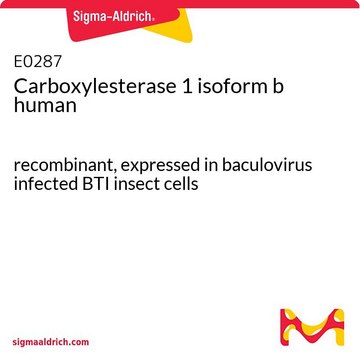C1682
Acetylcholinesterase human
recombinant, expressed in HEK 293 cells, lyophilized powder, ≥1,000 units/mg protein (Lowry)
Sinônimo(s):
AChE, Acetylcholine acetylhydrolase
Faça loginpara ver os preços organizacionais e de contrato
About This Item
Produtos recomendados
Descrição geral
Acetylcholinesterase (AChE) is a serine hydrolase, which belongs to the carboxyl esterase family of enzymes. AChE is localised at neuromuscular junctions and cholinergic brain synapses.
Aplicação
Acetylcholinesterase human has been used:
- as a standard protein to measure protein levels acetylcholinesterase AChE-R and AChE-S
- to stimulate human fibroblasts
- to study its in vitro catalytic activity and to determine the effects of metals, H2O2 and OH radicals on the activity
Ações bioquímicas/fisiológicas
Acetylcholinesterase (AChE) is regarded as a biomarker in neurotoxicity. It is a modulator of nitric oxide signal transduction pathway and marker of membrane integrity and aging. AChE, hydrolyzes choline esters. It terminates the impulse transmission at cholinergic synapses. AChE does this by rapid hydrolysis of the neurotransmitter acetylcholine (ACh) to acetate and choline. AChE inhibitors prevent the cholinesterase enzyme from breaking down ACh and increases the level and duration of the neurotransmitter action.
Major degradative enzyme for acetylcholine in vivo. Converts acetylcholine + H2O to choline + acetic acid.
Definição da unidade
One unit will hydrolyze 1.0 μmole of acetylthiocholine to thiocholine and acetate per minute at pH 8.0 at 37 °C.
forma física
This product is supplied as a lyophilized powder. Lyophilized from 0.22 μm filtered solution in 50mM phosphate buffer pH8.
Nota de análise
The activity obtained using acetylcholine as substrate is 30-100 times that obtained with butyrylcholine, using acetylcholinesterase from electric eel.
Código de classe de armazenamento
11 - Combustible Solids
Classe de risco de água (WGK)
WGK 3
Ponto de fulgor (°F)
Not applicable
Ponto de fulgor (°C)
Not applicable
Certificados de análise (COA)
Busque Certificados de análise (COA) digitando o Número do Lote do produto. Os números de lote e remessa podem ser encontrados no rótulo de um produto após a palavra “Lot” ou “Batch”.
Já possui este produto?
Encontre a documentação dos produtos que você adquiriu recentemente na biblioteca de documentos.
Os clientes também visualizaram
In vitro effect of H 2 O 2, some transition metals and hydroxyl radical produced via fenton and fenton-like reactions, on the catalytic activity of AChE and the Hydrolysis of ACh
Mendez-Garrido A, et al
Neurochemical Research, 39(11), 2093-2104 (2014)
Different cholinesterase inhibitor effects on CSF cholinesterases in Alzheimer patients
Nordberg A, et al.
Current Alzheimer Research, 6(1), 4-14 (2009)
Jiayi Liu et al.
Frontiers in plant science, 12, 720816-720816 (2021-08-31)
Essential oils (EOs) are often the source of insecticidal substances of high efficiency and low toxicity. From gas chromatograph-mass spectrometer, column chromatography, and nuclear magnetic resonance spectra analyses, twenty terpenes were identified from the EOs of Artemisia nakaii. These comprised
Agneta Nordberg et al.
Current Alzheimer research, 6(1), 4-14 (2009-02-10)
The current study aimed to compare the effects of different cholinesterase inhibitors on acetylcholinesterase (AChE) and butyrylcholinesterase (BuChE) activities and protein levels, in the cerebrospinal fluid (CSF) of Alzheimer disease (AD) patients. AD patients aged 50-85 years were randomized to
Sebastian Oddsson et al.
Molecules (Basel, Switzerland), 25(12) (2020-06-26)
Despite extensive efforts in the development of drugs for complex neurodegenerative diseases, treatment often remains challenging or ineffective, and hence new treatment strategies are necessary. One approach is the design of multi-target drugs, which can potentially address the complex nature
Nossa equipe de cientistas tem experiência em todas as áreas de pesquisa, incluindo Life Sciences, ciência de materiais, síntese química, cromatografia, química analítica e muitas outras.
Entre em contato com a assistência técnica



